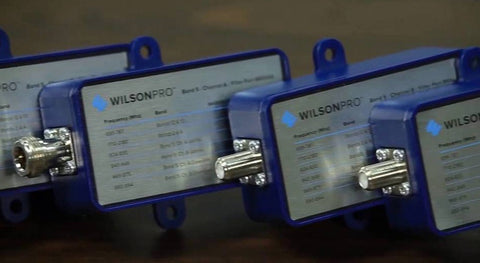Cellular Signal Filter Applications & Benefits
Sep 05, 2017

Why use cell phone signal filters for cellular signal amplifiers? In video below, we're going to cover the basics of cellular signal filters and how they can be utilized to prevent signal overload.
Transcript: So, here's the situation. You have got the signal booster all set up, and everything is working, but you're experiencing overload on a particular band. Therefore, you're not able to place a call. Overload means that your booster is receiving a strong signal from a nearby cell tower. This is good if it is a signal coming from one carrier, and it just means that the booster has had to reduce its amplification a little bit because the signal is so strong. But what if you need to boost the signal of another carrier that is weaker on the same frequency? What do you do?
The best course of action is to detune the outside antenna. Move the antenna away from the offending cell tower until the lights or the display on thew booster changes. You can also move the outside antenna to a different location that is shielded from the cell tower. But what if detuning the antenna is not an option? What if you're in this tricky situation?
Let us say for example our customer is using AT&T. Our installer sets up the booster and aims the outside antenna at the nearest AT&T tower. But, between the AT&T tower and the building, there's a Verizon tower blasting you with signal. You can't detune the antenna because then we will lose connection with the distant AT&T tower. But, because the Verizon tower is so close, it is overloading the booster and shutting it down. You don't need the Verizon signal or as much of it but you can't make a call AT&T either because the overload is causing the booster to shut down. This is where mobile signal filter comes in.
Cellular Filters are easy to install and we have multiple options available to filter out the undesired signal on Band 5. Sometimes referred to as 800 MHz band or cellular band, which is great because Band 5 is the most used cell band. To install a filter, all you need to do is connect it between the outside antenna and the booster. Connect one side to the cable coming in from the outside antenna. Then, connect a short 2-foot jumper cable to the other side of the filter, and attach that to the outside antenna connection on the booster.
Install a filter on the inside of a building as these are not designed to be weatherproof. You don't need to worry about which side goes to which, you can do it either way. You can't put it in backwards. Then the filter takes care of the rest. The filter will filter out or attenuate the undesired signal coming in on either Channel A or Channel B on Band 5 only, leaving your other signal intact. There are options for F or N connectors, so no matter what kind of cable you're running, you will have no problem installing a filter.
Deciding which filter you need requires a few key pieces of information. You will need to know which carrier or carriers are used with in the building. You will also need to know which channels those carriers are using. And you will also need to know which channel is causing the overload. A signal meter is the perfect tool for the job. Once you know which channel you want to keep and which channels you want to get rid of, then head over to signalbooster.com and find the filter that filters out the proper channels.
Share this post
4 comments


Do people who buy cell phone boosters have to buy cellular signal filters that often? I understand why you need one in certain conditions but I’m wondering if I should buy one when I get a cell phone booster. I’d hate to get it and not need it, but I wouldn’t want to have to wait for one before I could use the booster.
I don’t think there’s any question do mobile phone signal boosters work, but questions like what are the best cell phone signal boosters for cars and the best cell phone signal boosters for buildings. I like the idea of having a cell phone booster to improve call quality and data speeds, and I recognize with it being technology, there may be a need for things like filters. It doesn’t matter if I have a 3g cell phone booster or a 4g cell phone booster, I want to make sure it’s working right. So if I need a signal filter, so be it.
Glad the article mentioned these filters ARE NOT weatherproof. I’m used to more products being sturdy outside but you’re talking about some sophisticated equipment here. Wouldn’t want to look for something to help my cell phone signal booster and have it go on the fritz because I left it in the inclement weather.
Has anyone else experienced this problem? I’d like to know how likely it is that I will need a filter. They seem like just an additional step, but I’m curious because I live in a residential area and it seems unlikely I’ll need one. It’s good to know what other accessories may come in handy for a cellular booster.